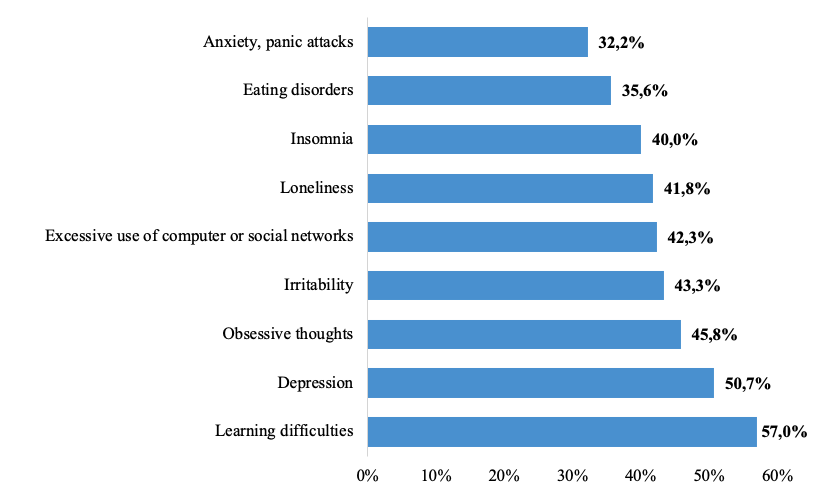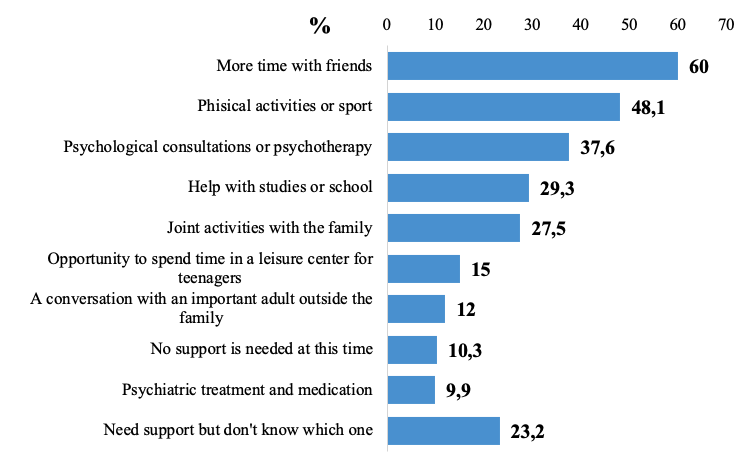Weekly Briefing, Vol. 39, No. 3 (LVA), April 2021
COVID-19: Mental Health of Latvian Adolescents and Young People
Summary
Adolescents and young people are the most vulnerable groups in terms of mental health. The Covid-19 pandemic and consequently restrictive measures to protect the population of the country from the spread of the virus influenced the mental health of young people strongly. This briefing is describing the current situation with mental health problems among young people, compare self-assessment of mental health during two waves of Covid-19, and provide the answer about possible solutions for youth mental health improvement.
Introduction
Adolescents and young people are the population groups, which have the least risk to be infected by Covid-19 but most affected by the restrictions of the pandemic. It is related to the peculiarities of brain development – socializing, spending time with friends, physical and other activities in adolescence are not only desirable but fundamentally important experiences for healthy development. These groups are the most vulnerable and mental health monitoring is of the utmost importance for them and their families. At the same time, exactly this group of people are forming the future of the country’s society, and the importance of their mental health has to be in the highest priority. The question is: how strongly Covid-19 has influenced the mental health of adolescents and young people? And what can be done to improve the situation?
Impact of COVID on the mental health of young people and adolescents in Latvia: research results reveal a harsh reality and call to urgent action
From December 2020 until January 2021 Adolescent and youth psychotherapy centre conducted a research of mental health of Latvian young people.[1] In the quantitative research took part more than 1600 respondents between 12 and 24 years of age from all over Latvia.
Young people were asked if they experienced any kind of mental health problems in the last two weeks and 7 out 10 people answered positively (72,1%). A comparative analysis of young people’s self-assessment of their mental health condition during the first and second waves of Covid-19 and the dynamics of its changes are shown in Figure 1.

Figure 1. Dynamics of mental health in the first and second wave of Covid-19
Source: Adolescent and youth psychotherapy centre data
It is clearly seen that the situation with mental health among young people become significantly worse during the second wave in comparison with the first one. The number of people considering their mental health as very bad has increased by 39,5% from 4,6% to 7,6%, while the result for the answer “Bad” skyrocketed by 54,4% for approximately a half of the year and now almost every third young person has some mental health issue. At the same time, the number of adolescents and young people, who believe that they have good or very good mental health has considerably reduced by 38,8% and 61% respectively. Altogether, now only 3 out of 10 young people believe that they have a good or very good mental health, while those who claim that there are some mental problems are accounted for 37,4%. The number of youngsters with neutral answer has also increased by 23,1% from 24,3% to 31,6%. The overall tendency is obvious: mental health problems among young people become a more and more common issue, while the proportion of those who have no such problems is strongly decreasing.
Respondents were also asked to provide their self-assessment about the influence of the pandemic on their mental health. The results are shown in Figure 2.

Figure 2. Self-assessment of health change due to Covid-19 pandemic
Source: Adolescent and youth psychotherapy center data
Figure 2 illustrates that more than half of young people (54,5%) mentioned that their health has deteriorated a bit during the pandemic. At the same time, 19,8% of respondents stated that their mental health greatly deteriorated. Meanwhile, 17,7% said that their mental health remains unchanged and only 8,6% mentioned that their mental health has slightly or greatly improved. The number of people with a worsened mental health is enormous, together it is 74,3% of adolescents and young people. There is a clear call to action, about three-fourths of respondents have a decrease in mental health, meaning that initiatives on the governmental level are needed to improve this situation and be ready to face and deal with the consequences of such significant deterioration.
To get a full understanding of what bothers young people the most, it is important to get a closer look at the certain mental problems that cause more issues among this population group.

Figure 3. Mental health difficulties experienced in the last two weeks
Source: Adolescent and youth psychotherapy centre data
Figure 3 shows that every reason for mental health difficulty represented among young people with a significant share. According to the data, the most common problems for young people are learning difficulties and depression (57% and 50,7% respectively experienced it). Remote studies are the safest option for physical health during the Covid-19 pandemic but as can be seen for the mental health of young people it is a traumatic experience as due to their age specifics, they do need more personal communication. The pandemic has shown all blind spots in the country functioning and one of the main issues is the approach of working with adolescents and young people. It is clear that professionals in the field of adolescents’ psychology and physiology have to work on the strategy for remote learning and interconnection between this age group. However, in Latvia, the switch to remote learning and restrictive measures were introduced so rapidly that it was not possible to think through every step of this turn and its consequences on people’s mental health.
Furthermore, 45,8% of young people in Latvia have faced obsessive thoughts, while 43,3% stated that they suffer from irritability. Again, the argument for poor remote learning policy in the country is that 42,3% of respondents mentioned that they feel excessive use of a computer or social networks, which can be hardly imagined in the pre-Covid world. Usually, youngsters spend a lot of time on computers or smartphones and only parent restriction can limit it. However, in the new reality, it is observed that young people realize that they are tired of the excessive presence of technologies in their lives.
Limited communication options have caused an increased feeling of loneliness among young people, 41,8% stated that such mental health difficulty as loneliness exist in their lives. At the same time, insomnia can be faced by 40% of respondents. Also, 35,6% of respondents stated that they have eating disorders and 32,2% of youngsters suffer from anxiety and panic attack.
Most probably several factors together influence such a worrying result – firstly, lack of contact with peers and amount of physical activity influence satisfaction with life and mental disorders among young people, secondly, excessive use of a computer and smartphones causes a lot of mental difficulties as previously young people more often used technologies for leisure but now it is their complete learning environment.
According to the respondents, the most helpful solution for mental health improvement would be the following (see Figure 4).

Figure 4. Solutions for mental health improvement
Source: Adolescent and youth psychotherapy center data
Adolescents and young people are answered by themselves regarding the best options for mental health improvement and the answers are presented in Figure 4. Only 10,3% of young people in Latvia claim that they do not need any additional support at this time, meaning that 9 out of 10 youngsters believe that some kind of mental help is necessary. The most popular options are spending more time with friends and do physical activities or sport, 60% and 48,1% respectively mentioned it. These two options are related to one another and due to Covid-19 restrictive measures, adolescents can’t maintain these activities on the usual level. 37,6% of young people told that they need psychological consultations or psychotherapy, which is almost 4 out of 10 people. These numbers are enormous considering that young people are less tend to visit psychologists in general. It is obvious that youngsters were not able to receive enough mental health during the Covid-19 pandemic and the consequences of it will be faced in the nearest future as this group of people is the most vulnerable but at the same time very important to form the future society.
Conclusion
The research results confirm the serious impact of the pandemic restrictions on the mental health of Latvian youth. Most young people are currently experiencing different types and intensities of mental health problems and can be expected to have long-term consequences for some of them. These consequences can have long-term effects on the life outcomes of these young people as well as on the national economy as a whole. It can also be concluded that the situation of young people in Latvia is worse than elsewhere in Europe – which could be related to poorly organized and difficult-to-access mental health care for young people. The government together with specialists have to develop a strategy for mental health improvement among young people. Moreover, this strategy has to be targeted and consider the opportunity to help everyone in need more personally.
[1] Pusaudžu un jauniešu psihoterapijas centrs. (2021). Latvijas pusaudžu un jauniešu mentālā veselība COVID-19 pandēmijas ietekmē. URL: https://61d65e37-01a0-426e-b0f4-fd3a092c2742.filesusr.com/ugd/9c12e9_f48f2b1239914bb7b85b88a2d14df51f.pdf
